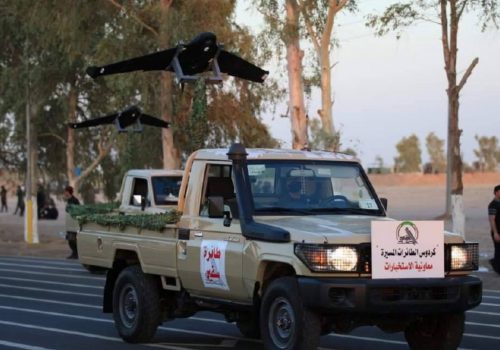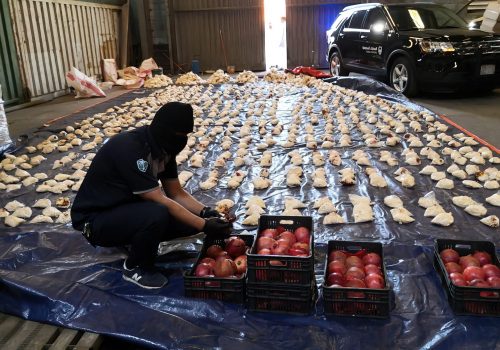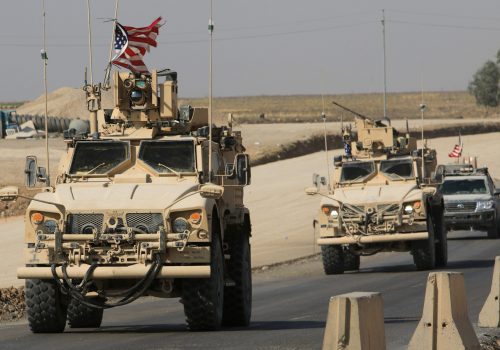Empower Syrians Not Warlords: Against the re-branding of Hayat Tahrir al-Sham
A slate of recent papers and policy briefings have advised Western governments to reverse their designation of the Syrian group Hay’at Tahrir al-Sham (HTS) as a terrorist organization. Such questionable policy recommendations are usually justified by arguing that HTS, under the leadership of Abu Muhammad al-Jolani, is a viable negotiating partner that is willing and able to rein in more dangerous global jihadist groups in Syria.
As Syrian researchers, we write this piece in response to analyses that seem driven by either a humanitarian idealism or sheer geostrategic realism. Both standpoints appear to betray the hope of building sustainable peace in a unified Syrian state. Current discussions about HTS and al-Jolani seem to suffer from a kind of cognitive convulsion that sometimes appears when evaluating the label “terrorist” in relation to Western security needs. Surely, the experiences of local victims in Syria should be of some account in the definition of political terror.
We argue that al-Jolani is not showing openness out of goodwill. Instead, we believe HTS is under pressure from both hardliners dissatisfied with al-Jolani’s pragmatism and locals unhappy with HTS’ management of socioeconomic affairs. Previously, the most important source of legitimacy for HTS was its military achievements during the conflict. However, due to current military stagnation, HTS’ leadership embarked on a campaign aiming to secure an alternative source of legitimacy—external recognition—but, crucially, its ideological framework as a jihadi organization has not changed.
A non-existent localization-moderation nexus
One of the biggest misperceptions by researchers is that global jihadis become more moderate when they localize even though there is no established link between localization and moderation. Such reorientation signals a strategic shift that does not necessarily touch on the core beliefs of these groups. Instead, what has changed is the immediate victims. Therefore, one cannot argue that the likes of HTS are becoming less relevant or less dangerous, especially from a humanist perspective.
In recent interviews, al-Jolani adopted a populist tone, appearing in PR films walking casually through the streets of Idlib and visiting local shops and businesses as though he were an elected politician. That cannot efface the fact that he is the leader of a jihadist militia that owes its stature to victories on the battlefield. If HTS is no longer slaughtering quite so many local civilians, it does not mean that yesterday’s jihadists have become “pragmatic” and “moderate” enough to be viewed as legitimate political actors. Allowing the warlords of the Syrian conflict, whether they are pseudo-secular dictators or self-proclaimed “moderate” jihadists, to recycle themselves as tomorrow’s leaders is short-sighted “realism” that will make the path towards democracy, stability, and prosperity harder to tread.
The cold geopolitical assessments that justify negotiating with warlords are painted in terms of stabilizing the situation and doing whatever is necessary to reduce violence and ensure the flow of humanitarian aid. As Syrians who have experienced danger and oppression firsthand, we say that physical survival is not the only consideration. People need dignity and agency as much as bread and fuel. This will not be possible if jihadist warlords such as al-Jolani are allowed to transition into the role of local political powerbrokers.
Al-Jolani’s negotiation cards
Since the Russian military intervention in September 2015, al-Jolani’s survival strategy has been built on two pillars: (1) maintaining al-Jolani’s leadership and (2) jumping onto the bandwagon of the popular uprising. al-Jolani recognizes that achieving his envisaged future role as a legitimized political powerbroker requires getting removed from lists of terrorist groups. He has embraced this as an agenda by emphasizing that HTS poses no threat to individuals outside of Syria. In his pursuit of international recognition, al-Jolani is instrumentalizing the issues of refugees, humanitarian aid, and fighting global jihadism. However, al-Jolani, who is leading this transformation, might abruptly decide to make another shift in a not-so-favorable direction if he is not satisfied in the future for any reason. Besides, any hasty cooperation with HTS will also give the group time to establish complete dominance over Idlib.
Like many jihadist leaders, al-Jolani has long combined conflicting messages of benevolence with violent intolerance. The recent effort to re-brand HTS does not depart from this trend. For example, al-Jolani’s recent denials of any sectarian violence on the part of HTS or its precursor, al-Nusra, bring to mind al-Jolani’s interview with Al-Jazeera in 2015, in which he kindly stated that members of the Alawite minority would not be killed under his rule so long as they abandoned both their support for Assad and their doctrinal religious beliefs.
There is no dearth of such rhetoric throughout al-Jolani’s rise to power: “For us, the Alawites are a sect that deviated from the religion of God according to the rulings of jurists and people of knowledge…For the Druz, they are subject to our da’wa [conversion] activities…For example, they have graves they visit and Islam considers this shirk [idolatry] so we ended that.” Ironically, this sharp distinction between “true” Muslims vs. heretical and dehumanized opponents is quite similar to Assad’s own reductive version of Syrian citizenship. In both cases, versions of fundamentalist ideology have been used to justify brutality against perceived “others”. In the case of HTS, the ‘other’ has been defined broadly as anyone who is willing to oppose their hegemony, including civil activists.
In his interview with Martin Smith, al-Jolani repeatedly hijacked popular support of Syrians living in exile by claiming legitimacy over their voice and offering himself as the only viable political choice. This echoes Assad’s claim to popular legitimacy and support. At the same time, there is no denying the fact that al-Jolani is willing to instrumentalize and manipulate the three million Syrians living under his control as his group has shown a willingness to kill and annihilate any opposition voice. Therefore, granting him any legitimacy will further divide Syrian communities and entrench Assad’s mobilization of security discourse.
Regardless of the newly discovered “pragmatic” or populist face that al-Jolani may present to the West, Syrians who disagree with his specific religious views are far from reassured. Nor are we comfortable with the current policy-analysis trend towards embracing HTS as a viable negotiating partner. Any rushed direct cooperation will deny regional powers any leverage to influence HTS while giving the latter time and license to establish complete dominance over the Idlib province, meaning that any subsequent efforts to dislodge the group will become extremely costly.
What does this mean for Syria’s political future?
We recognize that there is a humanitarian case to be made for cooperation, particularly when it comes to maintaining cross-border aid access and possibly cross-line cooperation to combat the severe food insecurity in Syria. However, it is vital that any cooperation does not morph into legitimization or de-facto acceptance of HTS regional control. Undoubtedly, any NGO working in Idlib needs to sometimes unofficially facilitate their humanitarian aid by cooperating with HTS. Despite this reality, any cooperation with HTS should be limited and conditional to prevent Syrians from being crushed by al-Jolani’s authoritarian ideology. Simultaneously, regional and international powers should recognize and magnify the voices of non-militant opposition groups, instead of rewarding warlords by dealing with them as political actors.
al-Jolani has appealed to cynical Western geopolitical interests. But it would be myopic to only see HTS’s limited stabilizing role while ignoring how the group’s totalitarian rule feeds the larger conflict with the Assad regime and serves to limit the growth of healthier civil institutions. The logic of embracing—at least from a Western perspective—the “lesser evil” is incompatible with genuine support for Syrians’ hope of reaching sustainable and inclusive civil rule. We are also aware that the abrupt dismantling of HTS could result in a power vacuum and perhaps a re-emergence of ISIS cells, but a segmental autonomy of Idlib, the sole empowerment of HTS, and the marginalization of other groups will further complicate any possibility of political transition in the future. Therefore, the multiplicity and decentralization of power may restore confidence and empower the people of Idlib to settle disputes locally at the grassroots level. It can also provide an inclusive atmosphere to vulnerable communities.
As the Syrian war enters its eleventh year, the international community continues to call for a negotiated settlement to the conflict. The question of who will be at the negotiation table is a critical one. The present military standstill can be an opportunity to reshuffle the political roles in the opposition camp. It can be an opportunity for regional and international powers to recognize and amplify the voices of non-militant opposition groups instead of rewarding warlords. HTS’ changing behavior will remain superficial without enabling civil activists and factions of the opposition to be allowed to fully participate in the management of social, economic, political, humanitarian, and military affairs in the northwest. Yet, considering al-Jolani’s hegemonic approach in Idlib, any proposal of power sharing with other factions will become a tool for co-optation and legitimation. Another risk is that any future schism or leadership dispute in HTS could create tremendous local destabilization in the absence of a healthy civic community to absorb the repercussions.
HTS’s military domination in Idlib has begun to shift toward a form of co-opted civic rule, but without a reckoning about how the group established its power or a consideration for the political aspirations of those who live under its hegemony. Currently, HTS’s ambition for complete governance is only lacking external legitimacy. If HTS gains this, it will be to the detriment of civil society groups and Syrians who aspire toward human rights.
Dr. Rahaf Aldoughli is a lecturer in Middle East and North African studies at Lancaster University in the United Kingdom.
Dr. Azzam Al Kassir is a Syrian researcher based in London. Al Kassir holds a PhD in Politics from Birkbeck, University of London and a master’s degree, with distinction, in Middle East politics from the University of Exeter.
Image: Islamist rebels from Hayat Tahrir al-Sham stand near a group of fighters. Via REUTERS.


